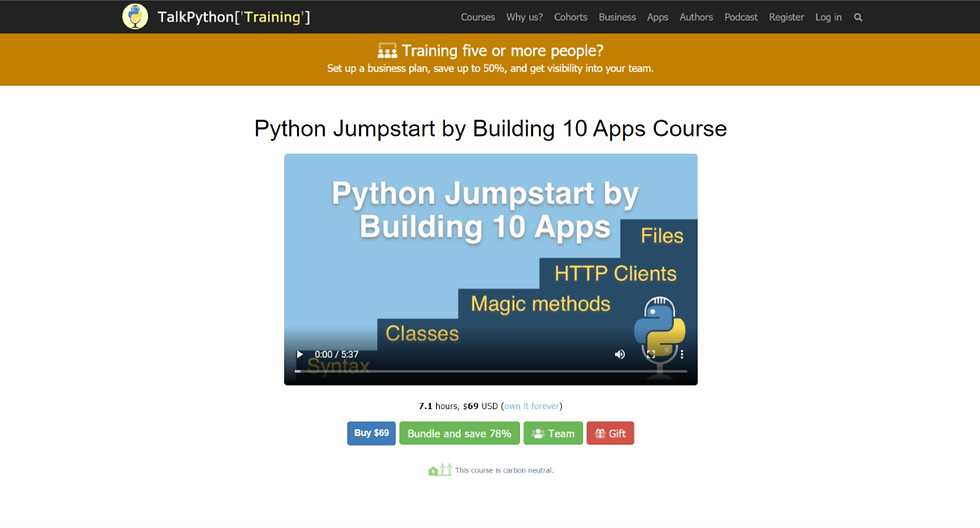
Have you ever wanted to learn Python but kept putting it off, or have you started but are feeling lost? Then this blog is for you. Our founder and CEO, Kai “Kevin”, and Python DevOps, Colin, share their favourite resources for learning Python, what they liked best about them, and how the knowledge that they got from these resources can aid qualitative data analysis. We recommend starting your Python journey with a friend (it is always easier to learn new things with someone else) and to try out some of the books and websites that we mention below.
These are not paid endorsements and we are not being compensated by any of these authors or websites.
1) Python Jumpstart by Building 10 Apps Online Course - [Talk Python Training]

Python Jumpstart by Building 10 Apps is a fun and engaging introductory course developed by Michael Kennedy and his team. It switches between theory to practice via pre-recorded coding sessions, so you have a holistic understanding of the language.
“This was one of the first Python programming courses I took and I’m very glad I did. It was a very fun and engaging way to learn the core concepts of Python through building 10 applications. We made simple number guessing games, a rock-paper-scissors RPG, and a weather app, just to name a few. Of course, having a solid foundation in the technical/mechanics of Python is important too, so for that I recommend the book Learning Python, 5th Edition by Mark Lutz.” - Kevin
2) Python Official Documentation

This is the official Python 3 documentation that has everything you need to know about Python. It is thorough in the details, and the tutorials are approachable and easy-to-follow. Even though this resource might seem a little bland, it does contain all the fundamentals of Python. If you want to learn Python to solve Natural Language Processing or other data science problems – make sure to check out this resource.
“It's probably not a coincidence that many popular languages have good, thorough documentation. Whether good languages tend to be easy to explain, or being well-explained helps languages gain popularity, may be a chicken-and-egg discussion for another article. For now; Python is no exception. Plenty of frustrating errors can be avoided by double checking a function's arguments, and confusing lines of code can be more intuitively written with features like list comprehension.” - Colin
3) Stack Overflow

Stack Overflow is a ubiquitous programming Q&A website. It has a large catalog of diverse questions about Python that range from beginners asking for help in layman’s terms to the surprisingly specific edge cases. It effectively adds tools to your kit, which should only improve the insights you can offer.
“If Python isn't your first language, you may have this open in another tab already. It's a great resource. Your question (or one like it) has probably already been asked and answered by smart and experienced developers. Common questions also often have thorough answers with a sense of why best practices are the way they are. This sort of context can be hard to find in technical documentation.” - Colin
4) A Whirlwind Tour of Python

A Whirlwind Tour of Python would be a great resource for people that already have some coding experience. It covers basic topics such as how to run Python code and Python semantics, as well as more advanced topics such as strings and regular expressions. It is a fast-paced introduction to Python, and it was specifically designed for those that want to learn Python for data science.
It is available online for free.
“Jake VanderPlas is a well-respected developer in the Python community. I had the opportunity early in my career to catch one of his presentation at the PyData conference. His A Whirlwind Tour of Python is a precursor to his published book, but it has everything you need to know in one place and will save you the hassle of having to Google each Python script differently.” - Kevin
5) Jobtensor.com

Jobtensor is primarily an employment platform and a job skills hub that is a novel and interesting resource. The job postings are currently limited to the UK and Germany, but the Knowledge Hub is the resource of interest for this article. The Python tutorials that are up on the Knowledge Hub are appealing and address common packages in Python for data science, like NumPy, Pandas, and SciPy.
“The best way to learn is the way that works for you, and Jobtensor makes getting hands-on programming experience that much easier. The in-browser IPython shell encourages you to try their exercises along with reading.” - Colin
Bonus: Natural Language Processing with Python

The first edition of this book is free and it is a great resource for anyone that is interested in how to do Natural Language Processing with Python. If you are looking to automate surveys or to analyze qualitative data, this book contains topics that would be of particular interest to you, such as automatic keyword and phrase extraction from text, analyzing the meanings of sentences, categorizing and tagging words, and so much more.
“The good thing about the Python community is that everyone is very generous, so a lot of resources are free, like this EBook. It may be a steep learning curve for someone that is just starting out with Python, but it is a fantastic resource.” - Kevin
If you are struggling with automating your surveys with Python or with qualitative data analysis, Kai Analytics can help. We specialize in Natural Language Processing and can analyze large qualitative datasets. Check out the services that we offer here.
Comments